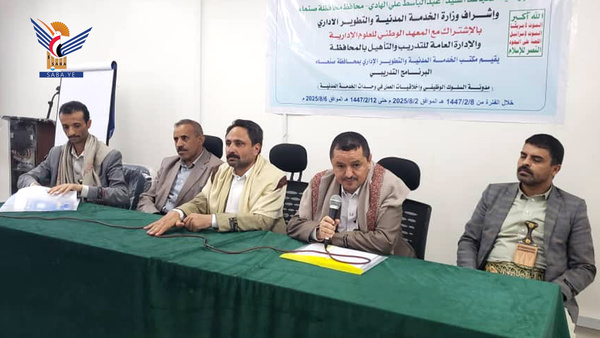
Sana'a - Saba:
A training program on the Functional Conduct Code and Work Ethics for several public service units commenced on Saturday in Sana'a Governorate.
The program is organized by the Civil Service and Administrative Development Office in collaboration with the National Institute of Administrative Sciences and the General Administration for Training and Rehabilitation in the governorate.
The five-day program, supervised by the Ministry of Civil Service and the local authority in the governorate, aims to equip 50 trainees from 30 executive offices with skills related to the Functional Conduct Code and Administrative Work Ethics.
During the inauguration, Abdul Qadir Al-Jilani, Secretary-General of the Local Council in the governorate, emphasized the importance of developing administrative cadres' skills to enhance performance levels. He praised the efforts of the Ministry of Civil Service and Administrative Development and the National Institute of Administrative Sciences in implementing such programs, which reflect the government's plans and initiatives.
Al-Jilani stressed the need to benefit from the program and apply it practically to streamline procedures and improve services for citizens.
Meanwhile, Abdullah Haydar, Deputy Minister of Civil Service for Oversight and Performance Evaluation, described the program as a charter for improving the work environment and reinforcing responsibilities to enhance services for citizens. He affirmed that it represents a fundamental step toward digital transformation.
Haydar explained that the code focuses on the behavior, ethics, and interactions of employees within state administrative units and is part of institutional development projects serving citizens and society. He highlighted that the code draws from references rooted in the Holy Quran, primarily aimed at serving people. He urged elevating public service by adhering to principles, values, and professional ethics derived from faith-based identity and national duty.
Haydar called on all participants to maximize the program's benefits and implement the Functional Conduct Code in practice.
During the opening ceremony, attended by the Technical Affairs Deputy Governor, Engineer Saleh Al-Muntaser, Suleiman Jubran, Director of the Civil Service Office in the governorate, emphasized the ministry's commitment to developing administrative work and citizen services by qualifying cadres and supporting local authorities.
He underscored the program's importance in advancing administrative work, improving services, simplifying procedures, and applying the Functional Conduct Code.
Additionally, the directors of Training and Rehabilitation at the ministry, Mohammed Al-Almani, and the governorate, Ali Zaid, along with program trainer Dr. Abdul Hakim Sufyan, discussed the program's objectives in enhancing administrative work, developing government services, streamlining procedures, and implementing the Functional Conduct Code.
A training program on the Functional Conduct Code and Work Ethics for several public service units commenced on Saturday in Sana'a Governorate.
The program is organized by the Civil Service and Administrative Development Office in collaboration with the National Institute of Administrative Sciences and the General Administration for Training and Rehabilitation in the governorate.
The five-day program, supervised by the Ministry of Civil Service and the local authority in the governorate, aims to equip 50 trainees from 30 executive offices with skills related to the Functional Conduct Code and Administrative Work Ethics.
During the inauguration, Abdul Qadir Al-Jilani, Secretary-General of the Local Council in the governorate, emphasized the importance of developing administrative cadres' skills to enhance performance levels. He praised the efforts of the Ministry of Civil Service and Administrative Development and the National Institute of Administrative Sciences in implementing such programs, which reflect the government's plans and initiatives.
Al-Jilani stressed the need to benefit from the program and apply it practically to streamline procedures and improve services for citizens.
Meanwhile, Abdullah Haydar, Deputy Minister of Civil Service for Oversight and Performance Evaluation, described the program as a charter for improving the work environment and reinforcing responsibilities to enhance services for citizens. He affirmed that it represents a fundamental step toward digital transformation.
Haydar explained that the code focuses on the behavior, ethics, and interactions of employees within state administrative units and is part of institutional development projects serving citizens and society. He highlighted that the code draws from references rooted in the Holy Quran, primarily aimed at serving people. He urged elevating public service by adhering to principles, values, and professional ethics derived from faith-based identity and national duty.
Haydar called on all participants to maximize the program's benefits and implement the Functional Conduct Code in practice.
During the opening ceremony, attended by the Technical Affairs Deputy Governor, Engineer Saleh Al-Muntaser, Suleiman Jubran, Director of the Civil Service Office in the governorate, emphasized the ministry's commitment to developing administrative work and citizen services by qualifying cadres and supporting local authorities.
He underscored the program's importance in advancing administrative work, improving services, simplifying procedures, and applying the Functional Conduct Code.
Additionally, the directors of Training and Rehabilitation at the ministry, Mohammed Al-Almani, and the governorate, Ali Zaid, along with program trainer Dr. Abdul Hakim Sufyan, discussed the program's objectives in enhancing administrative work, developing government services, streamlining procedures, and implementing the Functional Conduct Code.